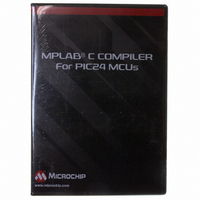SW006014 Microchip Technology, SW006014 Datasheet - Page 38

SW006014
Manufacturer Part Number
SW006014
Description
C COMPILER MPLAB FOR PIC24 MCU
Manufacturer
Microchip Technology
Type
MPLAB® C Compilerr
Series
PIC24r
Datasheet
1.SW006014.pdf
(246 pages)
Specifications of SW006014
Supported Families
PIC24
Core Architecture
PIC
Kit Contents
Software And Docs
Mcu Supported Families
PIC24
Tool Function
Compiler
Tool Type
Compiler
Processor Series
PIC24
Lead Free Status / RoHS Status
Not applicable / Not applicable
For Use With/related Products
PIC24
Lead Free Status / Rohs Status
Lead free / RoHS Compliant
- Current page: 38 of 246
- Download datasheet (3Mb)
DS51456E-page 34
SIGABRT
Description:
Include:
Prototype:
Remarks:
Example:
SIGFPE
Description:
Include:
Prototype:
Remarks:
Example:
Name for the abnormal termination signal.
<signal.h>
#define SIGABRT
SIGABRT represents an abnormal termination signal and is used in
conjunction with raise or signal. The default raise behavior
(action identified by SIG_DFL) is to output to the standard error stream:
See the example accompanying signal to see general usage of sig-
nal names and signal handling.
#include <signal.h> /* for raise, SIGABRT */
#include <stdio.h> /* for printf */
int main(void)
{
}
Output:
ABRT
Explanation:
ABRT stands for “abort”.
Signals floating-point error such as for division by zero or result out of
range.
<signal.h>
#define SIGFPE
SIGFPE is used as an argument for raise and/or signal. When
used, the default behavior is to print an arithmetic error message and
terminate the calling program. This may be overridden by a user func-
tion that defines the signal handler actions. See signal for an exam-
ple of a user defined function.
#include <signal.h> /* for raise, SIGFPE */
#include <stdio.h> /* for printf */
int main(void)
{
}
Output:
FPE
Explanation:
FPE stands for “floating-point error”.
raise(SIGABRT);
printf("Program never reaches here.");
raise(SIGFPE);
printf("Program never reaches here");
abort - terminating
© 2008 Microchip Technology Inc.
Related parts for SW006014
Image
Part Number
Description
Manufacturer
Datasheet
Request
R

Part Number:
Description:
Manufacturer:
Microchip Technology Inc.
Datasheet:

Part Number:
Description:
Manufacturer:
Microchip Technology Inc.
Datasheet:

Part Number:
Description:
Manufacturer:
Microchip Technology Inc.
Datasheet:

Part Number:
Description:
Manufacturer:
Microchip Technology Inc.
Datasheet:

Part Number:
Description:
Manufacturer:
Microchip Technology Inc.
Datasheet:

Part Number:
Description:
Manufacturer:
Microchip Technology Inc.
Datasheet:

Part Number:
Description:
Manufacturer:
Microchip Technology Inc.
Datasheet:

Part Number:
Description:
Manufacturer:
Microchip Technology Inc.
Datasheet:










